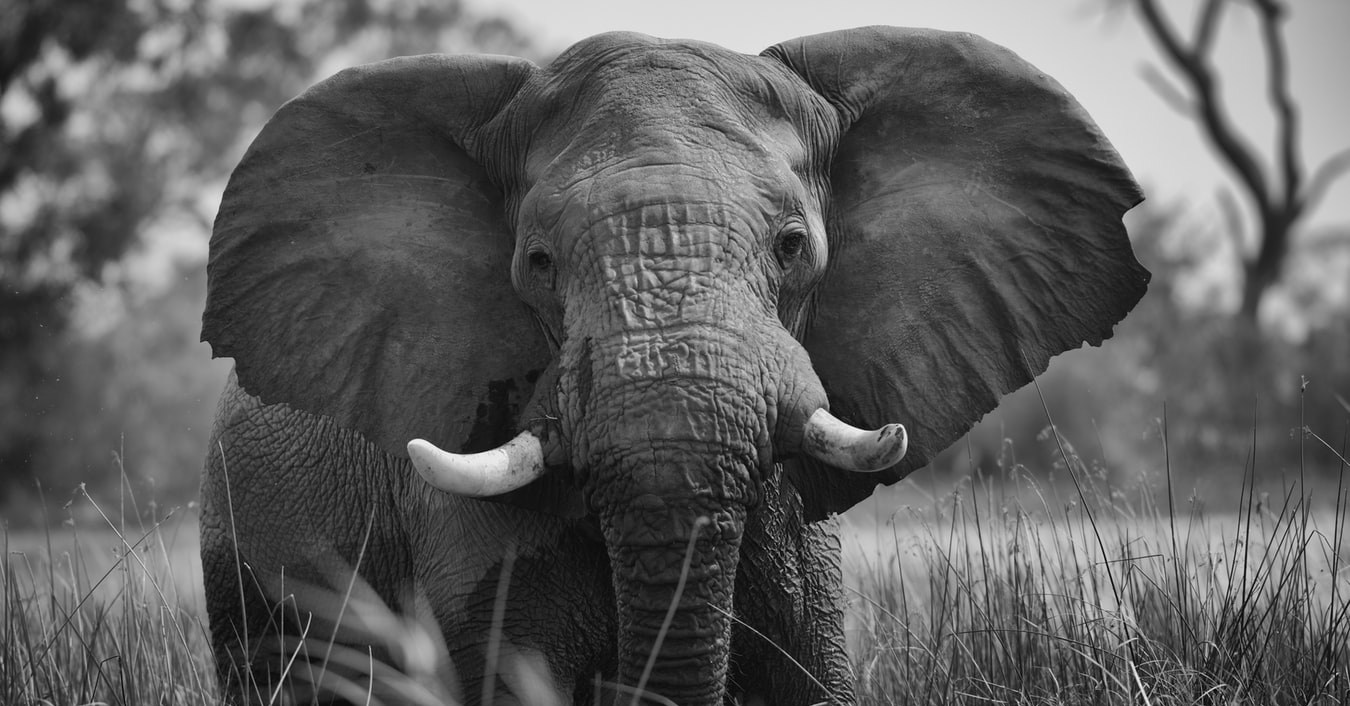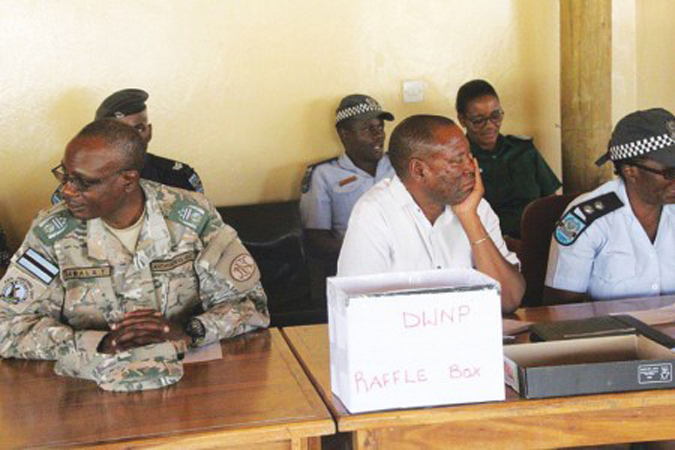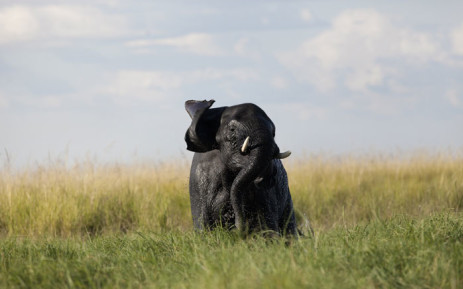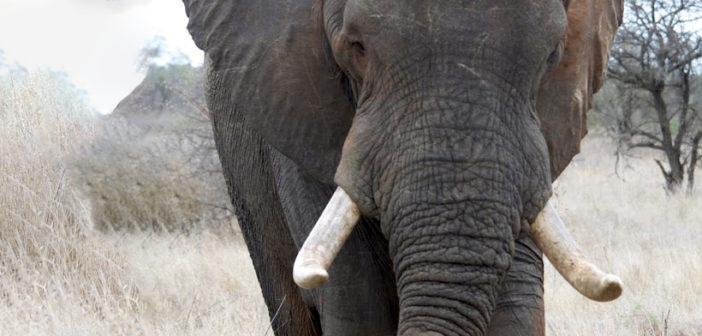 BY CORRESPONDENT - 6 JULY 2018 - MMEGI
BY CORRESPONDENT - 6 JULY 2018 - MMEGI
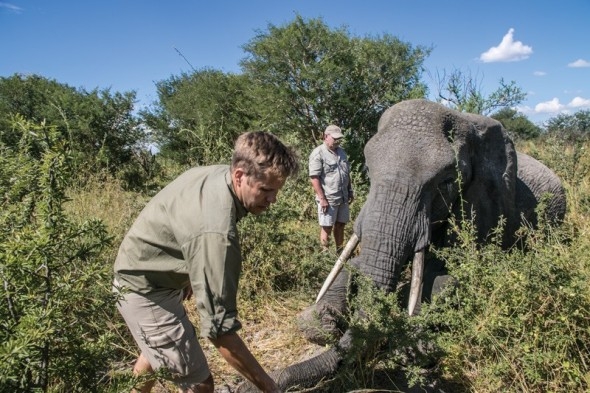 Dr Mike Chase collaring an elephant in the CKGR PIC: THALEFANG CHARLES
Dr Mike Chase collaring an elephant in the CKGR PIC: THALEFANG CHARLES
On June 21, 2018, some of Botswana’s Members of Parliament adopted a motion to lift the elephant hunting ban.
They cited the following reasons for this decision:
1. An increase in Botswana’s elephant population
2. Human Elephant Conflict
3. Less benefits from tourism
To effectively minimise human-elephant conflict (HEC), it is necessary to understand a suite of issues, including: elephant behaviour, biology and population dynamics; human attitudes and reactions; and the efficacy of management strategies. I am a Motswana elephant biologist, with 20 years’ experience studying elephant ecology throughout Africa, and in 2001 founded an NGO called Elephants Without Borders. I lean on my experience and published data by our research team in peer-reviewed journals to provide objective information. Issues of elephant management are complex and controversial, involving not only data and expert opinion, but also values, ethics and emotions of stakeholders all over the world.
1. Contrary to popular belief Botswana’s elephant population is not increasing. Many people assume that an increase in the number of conflicts between elephants and humans is automatically due to an increasing elephant population.
Increases in human-elephant conflict outside the ‘traditional elephant range’ are more closely associated with increases in human population densities than elephant population growth.
The last two elephant surveys (2010 and 2014) by the Department of Wildlife and National Parks (DWNP) and Elephants Without Borders (EWB) revealed an estimate of 130, 000 elephants in northern Botswana. Looking at 20 years of data, our demographic modelling, shows the elephant population has been stable for the past 15 years.
These results lend further support to the notion that the increase in complaints and human-elephant conflict over the last decade are due to elephant redistribution across the landscape coupled with an increase in human population densities and not an increase in the number of elephants.
Our aerial surveys and satellite movement studies reveal elephants have expanded their range by 35%. Between 2001 and 2017. Elephants are repopulating historical ranges in Botswana, occurring in areas where they have not been seen in the past 50 years, regions which are much more heavily populated and developed. People incorrectly conclude that this range expansion is a result of increased numbers.
Against a backdrop of poaching throughout Africa which has reduced elephants by 30%, or 144, 000 animals over a period of seven years, the recovery of Botswana’s elephant population must be heralded for what it is; one of the greatest conservation success stories in Africa. This is something we should all be proud of, and our conservation legacy is emblematic of the values Batswana strive for; peace, coexistence and Botho.
2. Members of Parliament are on record stating that resuming hunting will reduce human-elephant conflict implying hunting is the silver bullet to addressing the problem.
As a response, let me start by looking at the reasons elephants have expanded their ranges in Botswana.
i. Density dependent dispersal – search for food,
ii. Failure of the Kavango-Zambezi TFCA. Poaching and habitat constriction in southern Angola, Zambia and along Botswana’s borders have restricted elephants to remain in the safety of Botswana,
iii. Water availability in the form of artificial water and recent flooding events in previously dry rivers have enticed elephant to move further south, and
iv. Vet fences are effective barriers to elephant movements, but many of them have not been maintained and long stretches are broken giving elephants access to new areas.
In all likelihood, the reintroduction of trophy hunting will have no impact on any of these factors as they are unrelated to the ban on trophy hunting in 2014.
In addition, there is no evidence to support claims that within the traditional elephant range human- elephant conflict has increased. At a national level, complaints have increased largely because elephants now occur over a much larger area. DWNP problem animal control statistics reveal that in the Chobe Enclave for example, human-elephant conflict incidents now are the same as when hunting was permitted.
Hunting occurs in the dry season and targets large bulls, while elephant crop raiding coincides with the rainy season and the perpetrators tend to be young bulls or family herds.
The variation in the timing, space use, age and sex of problem elephants suggest hunting will have a limited effect on solving human-elephant conflict.
This does not mean that EWB or Government does not take the HEC incidents that do occur seriously.
They do, and all concerns raised by communities are absolutely valid. However, we have a new set of factors as outlined above, and DWNP, as the agent tasked with responding to HEC incidents, now need to respond accordingly and effectively to the anguish of communities.
The research EWB has done suggests that reducing HEC will require a range of interventions, including Government programmes, policies and incentives as an essential element of successful coexistence initiatives.
Amongst these, education and awareness around elephants, recognising elephant migration corridors, rapid response to conflicts, the allocation of agricultural plots in appropriate areas and the further promotion of localised ecotourism businesses can all play significant roles.
We don’t need more management plans and meetings! In the end, it is important to recognise that humans are a root cause of many of these issues, and that focusing on elephants as a threat or as an economic nuisance is largely counterproductive. To solve these problems, the central focus needs to be human behaviour.
3. The assertions that elephant hunting is a mainstay and that without it, communities get no benefit at all lacks evidential support. In fact, the impressive growth of the wider ecotourism industry over the last 20 years indicates the opposite.
Botswana is globally known as the ‘land of the giants’ a safe refuge for the world’s largest elephant population.
This has become a feature attraction to the thriving photographic ecotourism industry, the most significant employer and economic sector in northern Botswana.
In addition, without trophy hunting, Botswana has a comparative advantage as a safari destination over all its regional neighbours.
Tourists, who are increasingly seeking destinations offering responsible and ethical activities, can choose Botswana over countries offering hunting.
Some argue that a reintroduction of elephant hunting will cause Botswana’s brand irreparable harm overseas and a drop-off in tourism arrivals and thus in-turn either job losses or no growth in job creation.
A new emphasis in conservation in Botswana is needed, where we try to manage human-elephant conflict, and find ways in which preserving wildlife that is otherwise dangerous can benefit rural communities.
We must now harness our global position as a leader in wildlife tourism and ensure that our national elephant herd improves the quality of life for all Batswana.
DR MIKE CHASE
*Botswana born, Mike Chase, (PhD), has been studying the ecology of elephants since 2001 and was the first Motswana to receive his doctorate specifically in elephant ecology. Chase is the founder of Elephants without Borders and in 2015 was bestowed the Presidential Order of Meritorious Service Award by former President, Seretse Khama Ian Khama for exceptional service to the country and conservation efforts
Read original article:
http://www.mmegi.bw/index.php?aid=76545 ... 18/july/06




